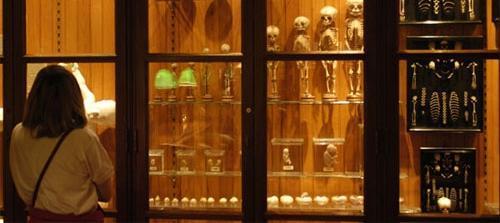Medical Museums are a gruesome attraction of medical tools and human oddities. While dissected cadavers, preserved parasites, and diseased organs fulfill our need to explore the human oddity in all of us, the strange fact that it is a "museum" makes visiting them a peculiar act of self-education in itself. Listed below are some medical museums in Philadelphia that you can visit. See the Complete list of: "Philly's Best Known Weird and Wacky Places to Visit."
- There's an unsettling site near the entrance to the bookstore at Drexel University College of Medicine East Falls campus: What appears to be string art in the shape of a person is the dissected nervous system of an African-American woman who reportedly worked at the college and left her body to science in 1888. The school's foremost anatomy professor at the time spent five months manually picking out every piece of bone and flesh from the carcass, wrapping each strand of the nervous system in wet gauze as he went and then allowing it to dry after pinning every nerve in its appropriate place. By appointment only. 2900 W. Queen Lane, (215) 991-8340, drexel.edu/medicine
- Suppose a trip to the dentist seems like a painful chore. In that case, it's worth letting one's mouth go agape at the antique (and slightly terrifying) drills, chairs, X-ray machines, furnaces, photographs, pearl-handled tools, and recreated Victorian office at the minute yet powerful Dr. and Mrs. Edwin Weaver III Historical Dental Museum. Visitors learn about more than 150 years of dentistry in America through artifacts contributed by Temple University Kornberg School of Dentistry faculty and alumni. 3223 N. Broad Street, (215) 707-2900, temple.edu/dentistry
- Fearless geeks tour the medical collection of the Mütter Museum of The College of Physicians of Philadelphia, where thousands of items on display span the medical realm, from deformed and diseased body parts to the death cast of "Siamese twins" Chang and Eng to pieces of Albert Einstein's gloriously nerdy brain. Filled with some impossible-to-believe specimens, the collections are still used to advance medical science today. The museum is also home to the outdoor Benjamin Rush Medicinal Plant Garden, named for the Declaration of Independence signer and college founder who urged fellow doctors to plant medicinal gardens to supplement their remedies. 19 S. 22nd Street, (215) 560-8564, muttermuseum.org
- While hospitals are typically places to avoid, students of medical history favor tours of Pennsylvania Hospital 19th-century theater, the first chartered hospital in the nation. Peering in the operating theater, visitors are reminded that early 19th-century surgeries were performed in front of an audience, with no electricity, no sterile technique, and a choice of rum, opium, or a "tap on the head with a mallet" for anesthesia. A seven-inch tumor was removed during one procedure by Dr. Phillip Syng Physick, dubbed the father of American surgery, and is in the Historical Library. Self-guided tours are available Monday through Friday; guided tours by appointment. 800 Spruce Street, (215) 829-3370, uphs.upenn.edu/paharc/tours/
index.html
Also, See.
- Philadelphia's African American Museums & Exhibits
- Philly Ranked #1 In Best Places to Visit in 2016
- Visiting Philadelphia On A Budget
- 18 Big Events & Reasons to Visit Philadelphia in 2016


